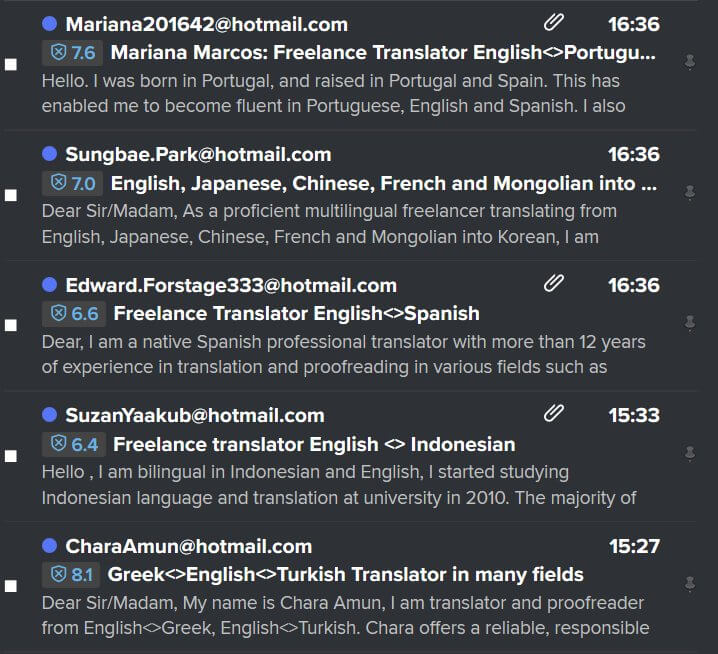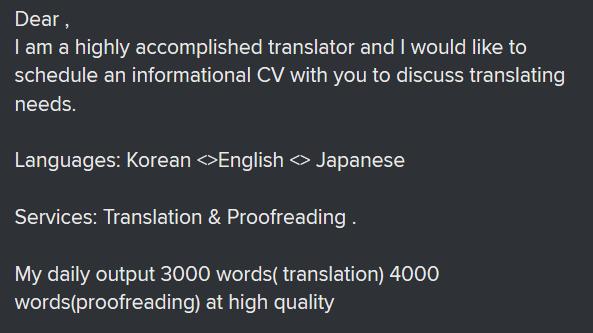If you’re a translator with a website, it’s very likely that you will get people sending you their CVs/resumes before long. Before you take the time to reply to each and every one of them, let me tell you about the CV scam, how it works and how to protect yourself from it.
What is the CV scam
Not too long after I started working as a freelancer with my own website detailing my services as a board game translator, I started receiving CVs from random people in my inbox. They never addressed me by name and always wanted to work for me, even though I’m not an agency. I usually ignored these e-mails, my reasoning being: If the sender won’t put the effort in to find out my name and what I do, I won’t put the effort in and reply to them.
With time, these e-mails became a lot more frequent, though, and meanwhile I can get up to 10 or 15 a day – thankfully, my spam folder over at Fastmail catches most of them.

This led me to wonder what the point is behind these e-mails – was I on a list of some company that sent CVs to multiple agencies for a price? Who was making money off this? Presumably, if I hired any one of them, they’d have to deliver first before I’d pay them, so what’s going on here?
The first victim: a translator
From what I gather, the first victim is a translator. Many translators will put their CV online on translator directories like Proz. The scammer takes this CV and impersonates that translator by creating a free e-mail address that goes with that name. If you’re brad.pitt@gmail.com they might go for brad.pitt@hotmail.com or bradpitt1963@gmail.com – you get the idea.
The reason they do this is presumably so that if you search for the translator whose CV was stolen, you find their profile online, so you might think they are legitimate.
Bring on the spam
Next, they’ll send out mass e-mails to anyone who might be receptive. Sadly, that includes me, even though I’m a translator myself. I imagine they’d much rather have agencies respond to them. Their pitch is mostly unconvincing, like this one from a Korean <> English <> Japanese translator, written in bad English:

Now let’s assume you reply to this and send them work.
Outsource or Google Translate
If you send them work, they need to somehow obtain a translation, so according to several sources I have found online, they will either run your text through Google Translate and call it a day, or they will hire a translator for a few cents a word somewhere. Either way they will end up with a terrible translation that will be unusable for the recipient. Then they’ll send it to you as the final product.
Alternatively, I suppose, they will hire a legitimate translator to do the work for them and then never pay them.
Demand payment
Regardless of your complaints about quality, they will then demand you pay them and issue threats if you refuse. If you’re a legitimate translation agency, being denounced online or rated badly on Proz’s Blue Board can be bad for business, so you might decide to count your losses and pay them anyway.
How to protect yourself from the CV scam
Now that you know what it is, you probably already have a good idea about how to protect yourself from it.
As an agency
- Ignore badly written e-mails.
All the fake CVs I get come with an e-mail written in fairly bad English, so it’s best not to fall for those. Most translators are sticklers for good grammar and while anyone can make a typo, translators pride themselves on their linguistic prowess. So ignore all linguists who clearly can’t spell! - Ignore e-mails not addressing you directly.
While it may be difficult for legitimate translators to find out your exact name, they should at least have an idea who they are writing to and reference you somehow. My name appears prominently on my website, but none of these scammers bother using it or the name I use for my business, Translation Geek.
As a freelance translator
As a freelance translator, you might not see a reason to reply to such e-mails anyway, but how can you protect yourself from having your CV stolen?
- Don’t put your CV online.
My suggestion would be to create a website for your freelance business and just put all the pertinent information right there. If you want to link to your work history or experience from your Proz profile, simply link to your website rather than a PDF file. While scammers could obviously still go to your website and stick all your info on a CV to pretend to be you, I doubt they would bother.
I hope this article helped shed some light on the CV scam and how to avoid it. To find out more about scams in general, you can see my article on the World Business Register in particular, plus Scams and how to spot them, which I wrote to help translators recognize fake translation jobs they might receive.
If you have any additional thoughts, feel free to drop them in the comments, and please sign up for my newsletter to get updated whenever I release a new article.






[…] feature for taking notes, and their spam filter is good enough to filter out a lot of the spam and phishing emails I get every […]